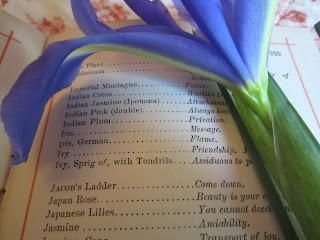Previously in the “Lessons from Literature”
series, we’ve looked at a lesson to be gleaned from the characters and one
provided by an author’s editorialization. This time, as we turn to Louisa May
Alcott’s 1870 novel An Old-Fashioned Girl, we see a lesson that can be
learned from the author’s decision-making process (into which she so
conveniently happens to give her readers a glimpse).
Once again, making the point requires a spoiler,
so consider yourself forewarned. Nevertheless, I don’t want to give too
much of the plot away, so I’ll simply share that Polly, the female protagonist,
and Tom, the male one, have spent a year apart after becoming acquainted over
the course of years and secretly falling for each other. Thus, they have been
tortured over the past year, thinking that their feelings were not reciprocated
or, worse, were directed toward others.
Suddenly, Tom returns, and he and Polly spend
the evening in the company of Tom’s family. As the evening draws to a close,
Polly is standing in the dining room preparing to depart, when Tom enters and
soon declares his love for her:
“Do you want to know the name of the girl I’ve loved for more than
a year? Well, it’s Polly!” As he spoke Tom stretched out his arms to her with
the sort of mute eloquence that cannot be resisted, and Polly went straight
into them without a word. (338)
And, here, Alcott makes her decision. Instead of
continuing to describe the scene in detail, she writes:
Never mind what happened for a little bit. Love scenes, if
genuine, are indescribable, for to those who have enacted them, the most
elaborate description seems tame, and to those who have not, the simplest picture
seems overdone. So romancers had better let imagination paint for them that
which is above all art and leave their lovers to themselves during the happiest
minutes of their lives. (338-339)
Even during the height of the Victorian era,
Alcott’s readers no doubt would have appreciated a more detailed accounting,
but she decides to step back and give her characters some privacy instead. In
other words, she recognized that not everything in life had to be published.
Now the most immediately apparent and directly
corresponding lesson might be something along the lines of respecting the
privacy of couples and not expecting them to share all the minute details about
their dates, their engagement, their honeymoon, their everyday life, etc.
But the lesson that first came to mind,
prompting this post, is the recognition that some things are meant to be
savored, not sent.
This reality was first brought to my attention
by a chapel speaker during my time in college who pointed out the effect social
media has had on our ability to enjoy the moment. For example, instead of
soaking in the sunset, we’re too busy trying to fit just the right portion of
it in our frame for a post-worthy photo. Instead of absorbing all the sights
and sounds of a celebrity encounter, we’re too busy trying to capture the
person’s image to prove and/or boast that the encounter did, in fact, happen.
Ever since that day in chapel, the speaker’s
message has stuck with me, because it’s so true. How often do we think in terms
of social media posts, or, put another way, how often do we do things that we
wouldn’t normally do just because we could post about it on social media?
Even that extreme aside, how often do we focus
more on documenting moments than we do on living them? Or worse, how often do
we miss the still, small whisper of God because we are consumed with snapping a
photo before the moment flies by? These are penetrating questions, but ones
worth wrestling with.
Don’t get me wrong, as a historian and archivist
the impulse to document moments is a strong and often useful one, but I have
come to realize that sometimes there is more value in absorbing the full
measure of a moment than there is in rushing to document it. As Alcott so
elegantly wrote, some things are “above all art,” so trying to capture them and
force them into written words or a conglomeration of pixels not only is futile
but also detracts from the moment’s poignancy.
Of course, this doesn’t mean that we should never
record videos, post pictures, or write entries in our journals. There are
certainly appropriate times to do each of these things. But sometimes we should
consider what we are missing when we choose to publish instead of pause. What
moments we squander when we neglect to savor them and instead send them across
the web!
So let's learn a lesson from Louisa May Alcott and leave some things undescribed. Who knows what raptures await?
So let's learn a lesson from Louisa May Alcott and leave some things undescribed. Who knows what raptures await?

Citation: Alcott, Louisa May. An Old-Fashioned Girl. New York: Puffin, 2004.


